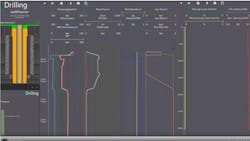CO2 drilling project concludes laboratory testing program
STAVANGER, Norway — eDrilling has issued an update on Project Green Light, the joint R&D program addressing knowledge gaps related to well control for drilling into CO2 storage reservoirs.
The partners include Equinor, Eni, Shell, Transocean, Baker Hughes, Wild Well, EBN, Noble Corp, SINTEF and GASSNOVACLIMIT.
WellControl CCUS will be the software solution for analyzing and predicting the associated risks of CO2 injection. The main ones identified include a CO2 kick leading to an uncontrolled blow-out and a cooling effect (Joule-Thomson) where the sudden temperature drop can cause damage to well control equipment.
The joint venture is seeking to develop software/services tools for planning/risk assessment prior to the drilling operation; maintaining and reestablishing well control in CO2 wells, and a tool for anomaly detection during drilling.
Another aim is to establish a methodology for assessing specific drilling fluid suitability with respect to drilling of CO2 wells in infill regions. Laboratory tests have been conducted using a full-scale well control simulator; these analyzed the interactions between CO2 and drilling fluids in a well control scenario and how the interactions might impact CO2 fluid properties including density, viscosity, sedimentation, hydrate formation and robustness (stability) at the time of injection.
From September 2023 to June 2024, the laboratory experiments focused on a mix of CO2 with three commercial drilling fluids: one oil-based and two water-based.
The main conclusions about the CO2’s behavior will be integrated into the software.
Project activities should finish at the end of this year with the launch of the first version of the WellControl CCUS software.
